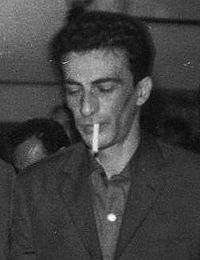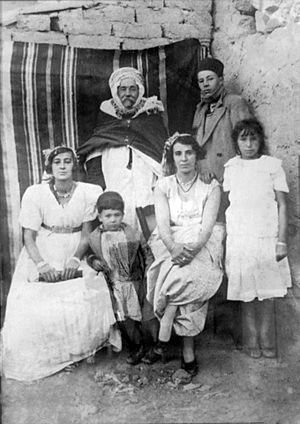Kateb Yacine facts for kids
Quick facts for kids
Kateb Yacine
كاتب ياسين |
|
|---|---|

Kateb Yacine at the Algiers book fair, 1962
|
|
| Born | Kateb Yacine 2 August 1929 Constantine, Algeria |
| Died | 28 October 1989 (aged 60) Grenoble, France |
| Resting place | El Alia Cemetery |
| Occupation | novelist, essayist, activist |
| Language | French, Arabic |
| Nationality | Algerian |
| Period | 1940–1989 |
| Notable works | Nedjma, Le Polygone étoilé |
| Notable awards | the Grand Prix National des Lettres in France, 1987 |
| Children | Amazigh Kateb |
| Signature | |
 |
|
Kateb Yacine (born August 2 or 6, 1929 – died October 28, 1989) was an important Algerian writer. He was known for his novels and plays. He wrote in both French and Algerian Arabic. Kateb Yacine also strongly supported the Berber culture and language.
Contents
Early Life and Education
Kateb Yacine was born in Constantine, Algeria, on August 6, 1929. His real name was Yacine Kateb. But he often heard teachers say last names first. So, he started using Kateb Yacine as his writer's name.
He came from a scholarly Berber family. His family moved often because of his father's job as a lawyer. Young Kateb, whose name means 'writer', went to a Quran school in 1937. Then, in 1938, he attended a French school. In 1941, he enrolled in a secondary school in Setif.
Political Awakening and Early Writings
In 1945, when Kateb Yacine was in school, big demonstrations happened in Setif. He joined these protests. They ended sadly with many Algerians being killed by the French army. Three days later, he was arrested and jailed for two months. This event made him a strong supporter of Algerian independence.
After being expelled from school, he went to high school in Bône (Annaba). There, he met a cousin named 'Nedjma' (meaning 'the star'). She became a big inspiration for his most famous novel. In 1946, he published his first collection of poems. He also became very involved in politics. He gave talks for the Algerian People's Party, a major nationalist group.
Journalism and Exile
In 1947, Kateb Yacine traveled to Paris, France. He called it "the lion's den." He joined the Algerian Communist Party in May 1947. He also worked as a journalist for the newspaper 'Alger Républicain' from 1949 to 1951.
After his father passed away in 1950, Yacine worked odd jobs. He returned to Paris and stayed there until 1959. During this time, he met other writers and artists. In 1954, his play 'Le cadavre encerclé' was published. It was performed but then banned in France.
His most famous novel, Nedjma, was published in 1956. During the Algerian War of Independence, Kateb Yacine had to live abroad. This was because of problems he faced from the French authorities. He lived in many countries, working as a guest writer or doing various jobs.
Return to Algeria and New Focus
After living in Cairo, Kateb Yacine returned to Algeria in 1962. This was right after Algeria gained its independence. He started writing for 'Alger Républicain' again. He also traveled a lot between 1963 and 1967.
In 1967, he went to Vietnam. This trip changed his writing. He stopped writing novels and focused on plays. He wrote 'L'Homme aux sandales de caoutchouc'. This play celebrated Ho Chi Minh and Vietnam's fight against foreign rule.
In 1970, Yacine moved back to Algeria permanently. He made a big decision: he stopped writing in French. Instead, he started creating popular plays in Algerian Arabic. These plays were for everyday people. From 1971, he toured all over Algeria for five years. He performed plays for workers, farmers, and students.
Between 1972 and 1975, Kateb toured France and East Germany with his plays. The Algerian government later asked him to direct a regional theater. He was not allowed on television. So, he staged his plays in schools or businesses. He was sometimes criticized for focusing on Berber traditions and the Tamazight language. He also had strong views on gender equality, like being against women having to wear a headscarf.
Later Life and Legacy
In 1986, Kateb Yacine shared a part of a play he was writing about Nelson Mandela. In 1987, he received a major literary award in France.
In 1988, his play about Robespierre was performed. Kateb Yacine traveled often to the United States and Algeria. He passed away in 1989, leaving an unfinished work about the Algerian riots of 1988. In 2003, his works were recognized by the Comédie-Française, a famous French theater.
Kateb Yacine learned French from his colonizers. He believed that the French language was something Algerians had won through their fight for independence. He once said in 1966 that using French did not mean he was working for a foreign power. He wrote in French to tell the French that he was not French. He could speak three languages. He also wrote and helped translate his works into the Berber language. His writings show Algeria's search for its own identity. They also show the hopes of its people.
Kateb Yacine had three children: Hans, Nadia, and Amazigh Kateb. Amazigh Kateb is a singer for the band Gnawa Diffusion.
Images for kids
See also
 In Spanish: Kateb Yacine para niños
In Spanish: Kateb Yacine para niños



